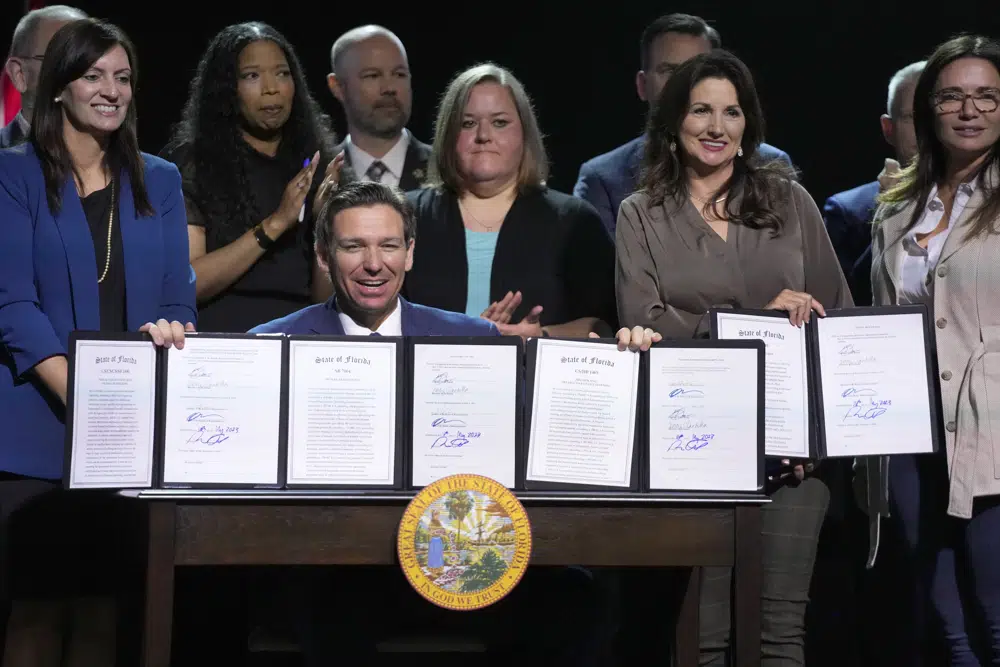In the midst of a nationwide surge in bills targeting the rights of transgender individuals, a federal judge is now deliberating on whether to block Florida’s recently approved ban on gender-affirming medical care for minors. The ban, signed into law by Republican Governor Ron DeSantis, has drawn significant criticism from medical groups and advocates who argue that it exacerbates the marginalization of transgender youth and jeopardizes their well-being.
Florida has emerged as a focal point for these restrictions, as Governor DeSantis signed multiple bills this week, including the ban on gender-affirming care for minors. The new legislation also imposes limitations on pronoun use in schools and mandates individuals to use bathrooms that align with their sex assigned at birth in certain cases. Additionally, the state has enacted stricter regulations on drag shows, granting authorities the power to revoke the food and beverage licenses of businesses that admit children to adult performances. Liquor licenses of establishments hosting drag shows have already been targeted by the DeSantis administration, alleging the presence of children during what they deemed as inappropriate displays.
The ban on gender-affirming care not only affects minors but also restricts state funding for such treatments and imposes new limitations on adults seeking similar care. These rules came into effect alongside the restrictions on drag shows, while the bathroom and pronoun restrictions will be implemented starting from July 1. Governor DeSantis has been a vocal proponent of these limitations and previously supported a Florida law that restricts the teaching of sexual orientation and gender identity in public schools. The prohibition, often referred to as the “Don’t Say Gay” law, has now been extended to encompass all grade levels.
The wave of bills curtailing transgender rights is not limited to Florida. Across the United States, hundreds of proposed measures have been introduced this year, aiming to restrict the rights of transgender individuals. At least 17 states, including Alabama, Arkansas, Arizona, Florida, Georgia, and others, have already enacted laws that limit or prohibit gender-affirming care for minors. Federal judges have intervened to block enforcement of similar laws in Alabama and Arkansas, while other states such as Texas, Nebraska, and Missouri have pending bills that seek to impose restrictions or bans. Oklahoma, however, has agreed to halt the enforcement of its ban while opponents of the law pursue a preliminary injunction in federal court.
Despite the rapid proliferation of these bans, only three states had enacted such laws before this year. Prior to the recent ban signed by Governor DeSantis, Florida was one of the two states that had restricted gender-affirming care through regulations or administrative action. Texas’s governor has ordered child welfare officials to investigate cases of children receiving such care as child abuse, although a judge has currently halted those investigations. In response to the new ban, three transgender youth and their parents have expanded their ongoing lawsuit to challenge Florida’s prohibition on care for minors.
All major medical organizations, including the American Medical Association, have expressed opposition to these bans and supported gender-affirming medical care for youth when administered appropriately. Lawsuits challenging these bans have been filed in various states where they have been enacted this year.
While some states are taking steps to limit transgender rights, others are actively working to protect the rights of LGBTQ+ youth. In Nebraska, lawmakers recently approved proposed restrictions on gender-affirming care for children as part of broader legislation that also includes a 12-week abortion ban. The legislation awaits Republican Governor Jim Pillen’s signature. Similarly, in Missouri, a ban on gender-affirming care for minors is awaiting action from Republican Governor Mike Parson. However, the state’s Republican attorney general, Andrew Bailey, withdrew a proposed rule that aimed to further restrict access to this care for both minors and adults, citing the pending bill as a reason.
Conversely, in Michigan, Democratic legislators introduced a bill to ban conversion therapy for minors, a discredited practice attempting to change a person’s sexual orientation. With Democrats in control of all levels of state government, the legislation is expected to progress swiftly, with hopes of passage by the end of June, coinciding with Pride Month.

